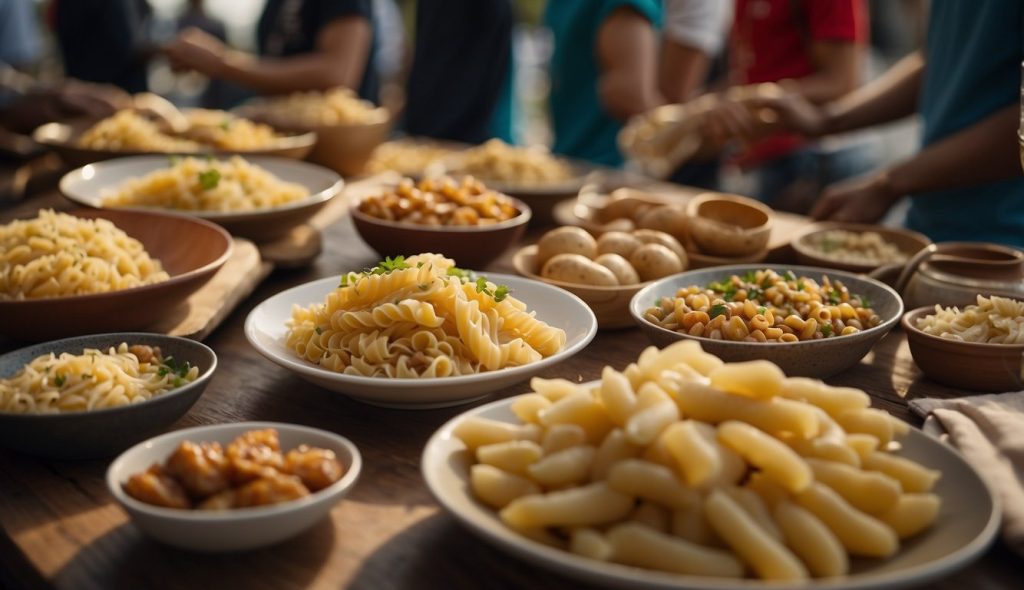
Carb loading foods are a key part of a nutrition strategy that’s grabbed the spotlight, particularly among athletes aiming to boost their performance. This tactic involves increasing your intake of carbohydrates in the days leading up to an endurance event or intense training session. The goal is to max out glycogen storage, which is the main energy source your muscles tap into during prolonged activity. Choosing the right carbs is essential as you gear up for your event, as they power your body and enhance your endurance.
For an effective carb-loading phase, you’ll want to focus on including a variety of carbohydrate-rich foods in your diet. Pasta, bread, potatoes, and rice are staples. They are easy to add to meals and can greatly boost your glycogen stores. Also, fruits like bananas provide quick energy. They are a great option for pre-run fueling. Also note that you can use both gluten and gluten-free sources of carbs. This gives you the flexibility to tailor your diet to your needs and preferences.
Remember that while carb loading focuses on carbohydrates, you still need to pay attention to the other aspects of nutrition. Balancing your meals with enough protein and fats. Also, timing your hydration well. This ensures your body is at its best on the day of the event. Avoiding common mistakes is important. Overeating fiber can cause stomach discomfort. This plays a key role in preparing your body for top athletic performance.
Explanation of Carb Loading
Carb loading is a strategy you might use to boost physical performance. You might do it before endurance events, such as a marathon. This diet involves eating more carbs. It fills your muscles’ glycogen stores. Glycogen serves as a crucial fuel source for your body during prolonged exercise durations.
Why Carb Load? Your muscles store glycogen from carbohydrates, which they later convert to energy. When you engage in endurance exercise, these glycogen reserves are your muscles’ primary fuel source. Carb-loading makes sure these stores are full. This can delay fatigue and boost performance.
How It Works:
- Typically, you start carb loading about three to four days before the endurance exercise.
- During this period, you aim to consume approximately 8-12 grams of carbohydrate per kilogram of body weight.
- The focus is on carbohydrates because they efficiently stock glycogen, whereas proteins and fats do not.
Your Diet: Choose low-glycemic, easily digestible carbohydrates to avoid digestive discomfort. Your diet may include:
- Pasta
- Bread
- Rice
- Potatoes
- Fruit
The goal is not just to consume more carbohydrates, but to adjust your diet while tapering off exercise to reduce glycogen depletion. By following this method, you fill your glycogen stores. This could lead to better endurance and physical performance during your event.
Importance of Consuming the Right Carbs for Athletic Performance
To improve your athletic performance, you must understand the role of carbs. That’s crucial. Carbohydrates are your body’s primary energy source, fueling your muscles during high-intensity exercise. Eating the right carbs is essential. They fill your muscle glycogen stores. These are the energy reservoirs. They delay fatigue and could boost endurance during training and competition.
Maximizing Glycogen Stores: To optimize athletic performance, your nutrition should focus on replenishing glycogen stores. Glycogen, the stored form of glucose, provides your muscles with a readily available energy source. Before long or intense physical activity, eating more carbs can fill your glycogen levels. This ensures that your muscles are ready for exertion.
Choose the Right Carbohydrates: Remember that not all carbs are equal. Choose complex carbohydrates. They include whole grains, legumes, and vegetables. They are your best healthy sources because they release energy gradually. Before training or competitions, easily digestible carbs help top off glycogen. They do this without causing stomach issues.
- High carbohydrate diets increase endurance capacity. A focus on carb-rich foods in the days leading up to an event can make a considerable difference.
- Fatigue: Having enough glycogen delays fatigue. This lets you keep high performance for longer.
- Recovery: After exertion, replenishing glycogen is key to recovery. This process aids in muscle repair and prepares you for subsequent training sessions.
Adding the right carbohydrates to your diet boosts your body’s energy systems. This is vital for top athletic performance and recovery. Remember, eating carbs consistently keeps energy up. It also leads to success in sports.
Health Benefits of Carb Loading
Carb loading is a good strategy. It boosts your glycogen stores. This improves your endurance and muscle recovery. It helps you do better in sports like marathon running, triathlon, cycling, or long-distance running.
Increased Glycogen Stores
Your muscles and liver store glycogen. It is the main energy source for long, moderate-to-high intensity exercise. Carb loading maximizes muscle glycogen stores, potentially doubling normal amounts. This surplus energy reserve is crucial for long events. They last longer than 90 minutes. In these events, glycogen might run low, leading to fatigue.
Improved Endurance
By consuming a high-carb diet in the days before your event, you increase the availability of readily-accessible energy. This results in prolonged endurance and a delay in fatigue. During your marathon, triathlon, or other endurance event, your extra glycogen helps you keep up. It lets you keep a steady performance over a long time.
Enhanced Muscle Recovery
Carb loading not only prepares you for the event but also aids in recovery. Adequate glycogen levels at the start of a competition can help prevent muscle protein breakdown for energy. After an event, eating carbs helps make glycogen. This cuts recovery time and helps muscles repair and build with protein. Remember, enough rest and water are also key. They are key for muscle recovery and overall nutrition.
Types of Carbohydrates

When you plan meals, you must understand the difference. It’s crucial to know between simple and complex carbohydrates. These two forms of carbs play distinct roles in energy management and have varying impacts on your blood glucose levels.
Simple Carbs
Simple carbohydrates, also known as simple sugars, are quickly absorbed by the body, providing a rapid energy source. These are the sugars found naturally in foods like fruit juice and processed in products like white bread. Their structure allows them to be quickly converted to glucose. Glucose enters your blood and can spike your glucose. Many simple carbs have high glycemic index values. This shows their potential to raise blood sugar quickly.
Examples of Simple Carbs:
- Glucose
- Fruit juice
- White rice
Complex Carbs
Complex carbohydrates pack nutrients. They include fiber, which slows digestion. provide lasting energy, unlike simple sugars. They also have a lower glycemic index, typically leading to a gradual rise in blood glucose levels. Your body digests these carbs more slowly, which means they provide energy over a longer period. Meals with complex carbohydrates can help you feel full longer. They also have the nutrient balance needed for sustained performance.
Examples of Complex Carbs:
- Brown rice
- Sweet potato
- Whole grains
Eating complex carbohydrates in your diet can support energy needs. This is especially true if you’re doing endurance activities that need carb loading.
Carb Intake Recommendations
Endurance Athletes use carbohydrate loading. It maximizes the storage of glycogen, or energy, in the muscles and liver before an endurance event. Your goal with this nutrition tactic is to enhance your endurance performance and delay the onset of fatigue.
Grams of Carbs per Day
Tailor your carb intake depending on the intensity and duration of your training. For a typical carb loading phase, you might consume between 2.3-5.5 grams of carbs per pound of body weight. If you weigh 154 pounds, for example, your intake could be between 353-847 grams of carbs per day. However, during the days leading up to the event, you could narrow this to a more specific 3.6-4.5 grams of carbs per pound to optimize storage without excess.
To incorporate carb loading into your meal plan effectively:
- Aim to select complex carbohydrates like pasta, rice, and bread that provide sustained energy.
- Spread your carb intake across all meals to maintain consistent glycogen levels.
- Hydration is paramount. Pair your carb-rich meals with adequate fluids to promote glycogen storage and avoid dehydration.
Carb Loading Foods : Frequently Asked Questions

Q: What foods are best for carb loading?
A: For carb loading, you want to choose high carb foods that are easy on your stomach. Think about eating things like pasta, rice, bread, and potatoes. These carb foods help fill up your body’s energy stores so you can do your best in sports or other activities. Don’t forget to add some fruits and veggies for balance!
Q: Is pizza good for carb loading?
A: Pizza can be a choice for carb loading because it has a crust made from dough, which is full of carbs. But be careful with toppings – too much cheese or greasy meats can make it harder to digest. Go for a pizza with lots of veggies and maybe some lean protein like chicken for a better balance. This way, you get the healthy carbs without overloading on the heavy stuff.
Q: What is an example of carb loading?
A: Carb loading is when you eat more carbs than usual to boost your energy before a big event like a marathon. For example, a couple of days before the event, you might have a big bowl of pasta for dinner. Then oatmeal or a bagel for breakfast. And a sandwich with extra bread at lunch. Your snacks could include fruits and yogurt. The idea is to fill up your body’s energy tank so you’re ready to go on the big day.
Q: What foods to avoid when carb loading?
A: When carb loading, it’s best to avoid foods that are high in fat and fiber, as they can cause tummy troubles and slow down digestion. Skip greasy foods like fast food burgers, high-fiber veggies like broccoli, and rich desserts like cheesecake. Also, be careful with super sugary foods and energy drinks that can spike your blood sugar quickly and then make you crash. Stick to simpler carbs that your body can use easily for energy.
Q: How long does it take for carb loading to work?
A: Carb loading usually starts about 3 to 7 days before your big event. During this time, you’ll gradually eat more carbs and do less intense workouts. Your body needs these days to build up extra energy in your muscles. So, if your big game or race is on a Saturday, you might start loading up on carbs around Monday or Tuesday. By the time you’re at the starting line, your energy stores will be ready to help you go fast and stay strong!

